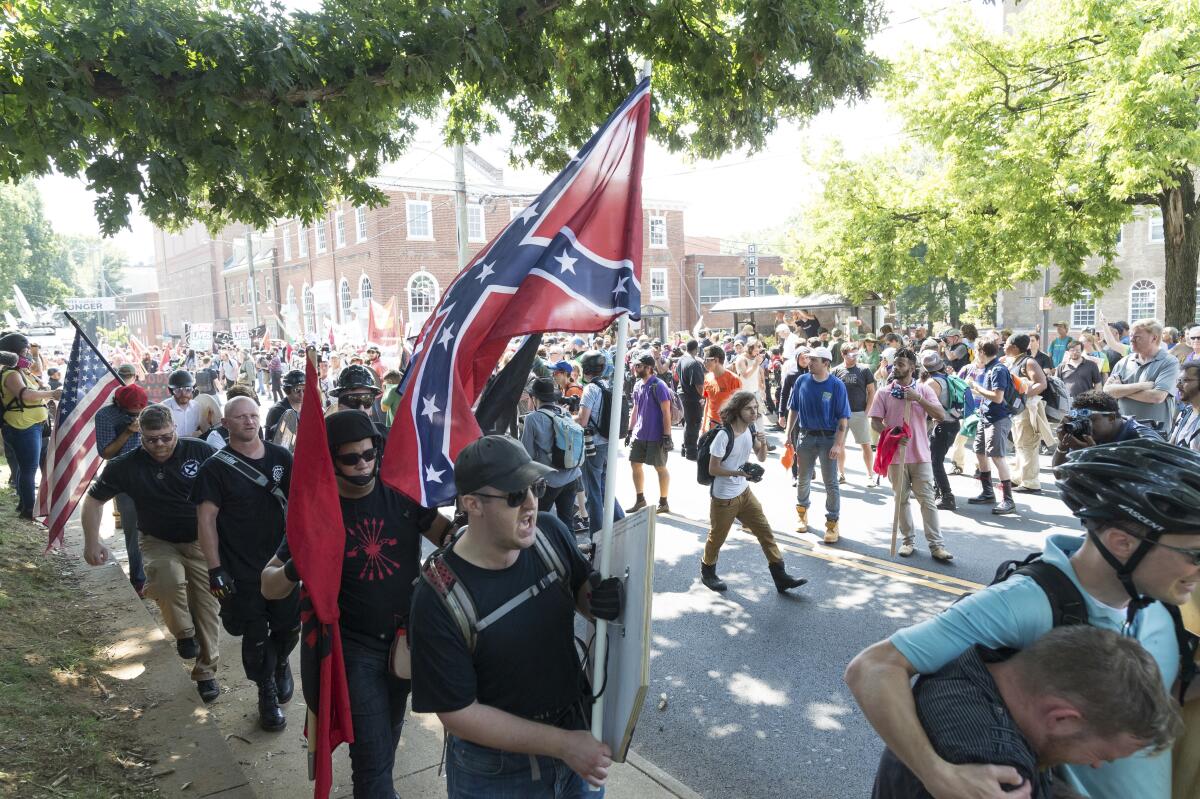Column: Why the ACLU should continue to defend free speech — even when it’s vile

In my first job, right out of college, I worked as a lowly researcher at the national headquarters of the American Civil Liberties Union.
It was 1981, just a few years after the organization made the explosive, controversial decision to defend a group of American Nazis who wanted to march in uniforms with swastikas through a Jewish neighborhood in Skokie, Ill. The ACLU’s lawyers won the case, but lost tens of thousands of members in the process.
When I worked there, nasty phone calls were still coming in and donations still being canceled. But the ACLU’s position was unequivocal and unapologetic: Free expression is free expression, and if you don’t defend it when it’s used by abhorrent people with repugnant beliefs, then it won’t be there for you when you need it.
I was 23 years old, the son and grandson of refugees from Hitler’s Europe. Several members of my family had died only a few decades earlier at the hands of the Nazis, but to me, the ACLU’s willingness to defend the indefensible was an awe-inspiring assertion of a deeply held principle.
Now, 40 years later, similar struggles are again rocking the ACLU, and some fear that the organization’s long-held principles may not hold. According to a New York Times story last week, a battle is underway, pitting an older generation of free speech defenders against younger staffers who believe that free speech should take a back seat to other progressive priorities.
To the latter, it is inexplicable why the organization would spend its limited resources helping racists and Nazis express harmful and dangerous opinions when it could be fighting against racism itself, against Donald Trump and Trumpism and in support of the constitutional rights of Black people, LGBTQ people, women and others.
“First Amendment protections are disproportionately enjoyed by people of power and privilege,” the former director of the ACLU’s Racial Justice Program said, seeming to discount the ACLU’s historic mission to defend even offensive speech.
The ACLU’s internal conflict has deep roots, going back well beyond Skokie almost to its very inception 101 years ago.
In 1934, for instance, the organization was already on the defensive, issuing a controversial pamphlet titled “Shall we defend the free speech rights of Nazis in America?” In it, the organization wrote: “If the [ACLU] ... condoned the denial of rights to Nazi propagandists, in what position would it be to champion the rights of others?” Among those who could lose free speech rights if Nazis lost them were birth control advocates and pacifists, the pamphlet argued.
For the most part, the organization has stuck to its principles, defending the speech rights of organizations it disagreed with, from the Ku Klux Klan to the pedophiles of NAMBLA to the adherents of the Westboro Baptist Church, which the Southern Poverty Law Center has labeled “arguably the most obnoxious and rabid hate group in America.”
But on some occasions, the group has bowed to critics who asserted that free speech had its limits.
In 1940, for example, it capitulated to red baiters by expelling Elizabeth Gurley Flynn, a communist and founding ACLU member, from its board of directors. Twenty-six years later, the ACLU officially acknowledged that to have removed Flynn solely because of her political opinions was contrary to its values.
When communists were being blacklisted in the 1940s and ’50s, many complained that the ACLU failed to speak out forcefully. In the 1970s, like today, critics contended that abstract talk about the 1st Amendment rights of Klansmen “ignored the rights of Blacks.”
The most recent iteration of this internal battle began in 2017, when the ACLU fought on behalf of the right of white nationalists to protest in downtown Charlottesville, Va. — only to watch as the march descended into brawls and confrontations and ultimately to the killing of a 32-year-old counterprotester. That led to much soul-searching about guilt and complicity, and not long after, the ACLU announced new guidelines for selecting future cases that disturbed some longtime supporters — suggesting it might reject free speech cases that “impede progress toward equality” or cause trouble for “allies and coalition partners.”
I fall squarely into the defend-unpopular-speech camp. The ACLU does lots of great work, including fighting for immigrants and LGBTQ people and racial justice. But its commitment to the 1st Amendment has always been its core mission.
Call me fusty, but I still believe, because we’ve seen it in the world again and again, that if government silences the people you disagree with today, they can silence you tomorrow. The victims of government censorship are most often the powerless, the poor and those who dissent.
As Supreme Court Justice Benjamin Cardozo wrote in 1937, free speech is the “indispensable condition of nearly every other form of freedom.”
That doesn’t mean there’s nothing left to debate. In a world where Donald Trump could send scurrilous lies and inflammatory exhortations to tens of millions of followers with the click of a mouse, there’s obviously much still to decide. That includes what constitutes “incitement” to violence and what are the dangers of hate speech.
But don’t toss the idea of free speech overboard.
The leaders of the ACLU, to their credit, have forthrightly acknowledged the conflicts between the organization’s different values and priorities, and say they are working through them. The organization has decided, for instance, not to defend groups that want to bring weapons to protests. It has said that, even as it defends an unsavory client’s right to free expression, it might also declare publicly that it opposes the client’s message.
David Cole, the ACLU’s smart and thoughtful national legal director, says the organization can address those conflicts “not by abandoning any of our core commitments, but by acknowledging and confronting the conflicts in as forthright, inclusive and principled a way as we can.”
Cole says that none of its principles or values gets “automatic privilege” over another. That’s fair enough.
But if the ACLU is to remain the ACLU, it must remember its roots. And when the next Skokie comes along, it should again stand up for the right to peaceful speech, protest and expression.
@Nick_Goldberg
More to Read
A cure for the common opinion
Get thought-provoking perspectives with our weekly newsletter.
You may occasionally receive promotional content from the Los Angeles Times.











